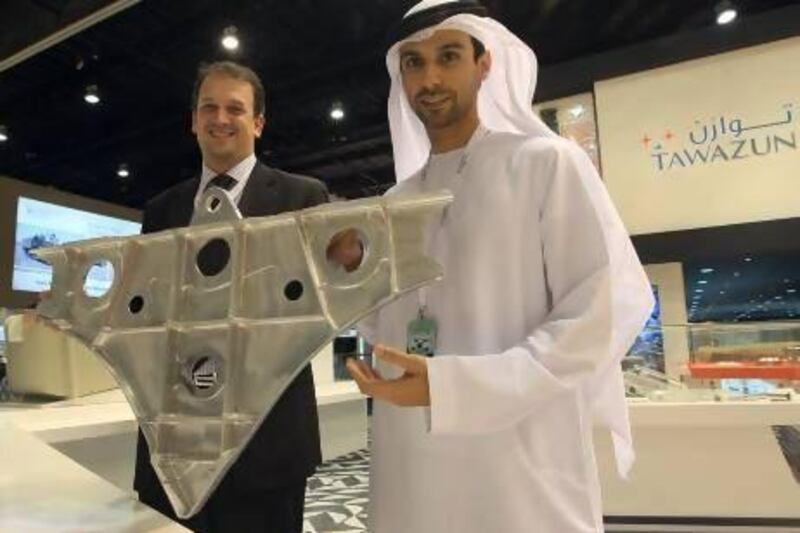ABU DHABI // Eurofighter Typhoon jets, sold around the world, are soon to have UAE-made components, it was announced yesterday at the International Defence Exhibition.
The advanced, multi-purpose fighter, developed by a European consortium of EADS, Alenia Aeronautica and BAE Systems, will be incorporating a major structural component developed by UAE company Tawazun Precision Industries (TPI).
The development was announcd by Enzo Casolini, the chief executive of the Eurofighter holding company, GmbH.
Mark Parkinson, the business development manager for combat air military and information at BAE Systems, said the component is a pure aluminium V-frame used at the rear of the aircraft, near the engine.
"It is a major structural component in the aircraft and we have done our first article inspections," he said.
He added that the V-frame component is a high-tolerance part and that the first piece made is on display at the exhibition.
"So far, the product has proven to be good and is looking good," he said.
TPI had also been listed as an accredited supplier of the component and further parts may be manufactured in the UAE.
"We are also in talks to develop titanium firewalls at the TPI factories," said Andy Wilson, industrial partnerships and offset director for military air and information at BAE Systems.
Titanium firewalls are shields that suppress the engine blast fire from spreading in to the fuselage of the aircraft.
Mr Wilson said that BAE is in discussions with other UAE-based defence industry manufacturers to develop other components.
Meanwhile, talks are ongoing between the Government and Eurofighter for the incorporation of the jet fighter into the UAE fleet, as well as with Dassault Systems for its Rafale multi-purpose fighter.
According to the Idex and Navdex chairman, Staff Maj Gen Obaid Al Ketbi, the negotiations are progressing well. "The two companies and the UAE Armed Forces are still working on the project. It is not yet finalised. It is a question of time," he said.
"Both teams are working very hard to come up with a final settlement on the deal itself and a final agreement. Some things still need to be studied more and we have not yet decided," he said.
Mr Casolini said: "I will be finishing my term by May this year as CEO and I hope that the deal is finalised."
He stressed that his aircrafts are adaptable to the client's needs and they can accommodate any requirements.
BAE Systems' Laurie Hilditch said the Eurofighter Typhoon had been in development since the 1980s and the first was delivered in 2003.
"The special thing about the Typhoon is that it is adaptable and built to be enhanced and continuously developed," he said.
"The goal is to maintain a multipurpose, high-performance, cutting edge technology aircraft and we have the only fighters in the world to be interoperable with the advanced United States F-22 raptors."
Senior manager of operations at TPI, Vincent Mohi, said that the manufacture of components for Eurofighters highlights the capability of the UAE company.
"We have been producing components for civilian aircrafts and now also military," he said. TPI, which has more than 100 Emirati engineers and workers, also develops components for the Marte anti-ship missile systems for Paris-based MBDA missile systems.
MBDA is a missile developer and manufacturer with operations in France, Italy, the US, UK, Germany and Spain.
According to Michele Di Nunzio, the sales manager at MBDA, the company is looking to increase its work with TPI and develop more components locally.
"We would like to work on other parts of the missile system here and even other kinds. The final products would be sold all over the world with UAE-made components," he said.
Mr Mohi said that the value of chain assembly locally is beneficial to the UAE's industrial programme, however, but challenges remain.
"There are millstones to get through to be able to completely construct high-technology materials and, although we have been operating for only two years, we are developing and getting there," he said.
[ amustafa@thenational.ae ]






